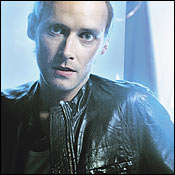
German electronic music has long been demanding, cerebral, and, to American ears, distinctly machinelike. Even the band names, with their industrial allusions and abrasive consonants—Kraftwerk, Can, Faust—communicated a certain intensity of purpose far from synonymous with the get-on-the-dance-floor mantra of American house music: “Jack your body!” Yet Kompakt, a fledgling music combine based in the old Rhine Valley industrial center of Cologne, is fomenting a new techno scene that abjures dour Teutonic anti-humanism in favor of the ecstatic dancing and dewy optimism of rave culture. Earlier this year, the label hosted a showcase at the Brooklyn nightclub Volume, drawing nearly 1,500 revelers who danced shoulder-to-shoulder until dawn on the club’s packed, arenalike dance floor. The massive turnout bested a concert at Volume from U.K. rap superstar Dizzee Rascal a month earlier.
In structure, at least, Kompakt retains a traditionally Teutonic desire for order: It is a vertically integrated electronic-music empire consisting of a record label, record store, distributor of dance-music labels, and booking agency. But Kompakt’s Stateside career has been a more buzzy, word-of-mouth proposition. Word is spreading wider now, thanks to a handful of the label’s releases’ landing in 2004 “best of” lists in Spin and the music Website Pitchfork Media. And with a recently inked deal with U.S. distribution giant Caroline, Kompakt looks to broaden its audience still further.
Kompakt records are, in every sense, aesthetic statements. The label’s more than 100 releases have the same sparse sleeve design; most have the minimal techno battery of clicks and hisses. There’s even a producer signed to Kompakt named the Modernist.
Kompakt has already invented an influential techno subgenre called schaffel (German for “shuffle”), whose back-and-forth rhythms sprang from Kompakt owner Wolfgang Voigt’s rework of glam band T. Rex’s “Hot Love.” Via its later appropriation by producers like Richard X, schaffel has become the backbeat to chart-topping Euro-pop.
But while Kompakt is well known for being an incubator of new sounds, it studiously avoids the narrow, specialist approach of most boutique labels, opting instead to release everything from pastoral techno (the operatic female vocalist and pillowy synths of Jürgen Paape’s “So Weit Wie Noch Nie” or “So Far, Like Never”) to the song-driven music of the D.J. Superpitcher, whose “Tomorrow,” with its insistent, optimistic chorus “Tomorrow will not be like today / Tomorrow … I will be happy” is a Kompakt anthem.
Still, Kompakt’s producers and D.J.’s work hard to play down any hints of pretense. “We’re viewed as mad scientists working behind laptops, but even when we’re at our most abstract, we love to party,” explains label co-founder and production impresario Michael Mayer. “Our music was never meant to be a design object placed in the corner.”
Kompakt was initially a Cologne record shop named Delirium, whose first customer was a demanding Mayer. “I immediately started complaining,” Mayer says of his first visit to the shop. “I couldn’t find any of the records I was looking for.” Just six months later, Delirium owner Wolfgang Voigt brought Mayer on as a partner. After a number of abortive launches of new labels, Kompakt was born.
Last month, the label released its best single of 2004, the MFA’s “The Difference It Makes”; its trilling vocoded vocal, languorous bass line, and sighing synths produce a trance sound that is nearly amniotic. Next month, Mayer will release his debut project as a producer, Touch. Meanwhile, Mayer’s touring schedule is filled with global superclubs like Ibiza’s Amnesia and London’s Fabric.
All great music is made by obsessives, and Kompakt is no exception. Mayer has been on a nearly decade-long quest to track down a pair of obscure New York house producers named How and Little, who, he says, “made five out of ten of my favorite records of all time.” He’d love to sign them to Kompakt. “I can’t accept that they’re lost,” Mayer says. “They are the reason why I’m here.” Could Kompakt inspire a similar loyalty in a new generation of listeners? “At the very least, we want to establish a solid infrastructure for this music,” Mayer explains, “but it would be even better to be so vital that you feel as though you are discovering something new every week.”

Cologne has long been a fertile breeding ground for cutting-edge pop music. In 1968, the city’s avant-garde rock group Can launched a career whose influence stretched well beyond the band’s ten-year recording career. Around the same time, the Cologne-born art-rock phenom Nico rose to prominence as the Velvet Underground’s chanteuse. And in 1971, the classically trained Cologne-based duo Kraftwerk released albums generated almost entirely by computer, prefiguring the rise of today’s techno-dominated pop by at least twenty years.
Kompakt
www.kompakt-net.de